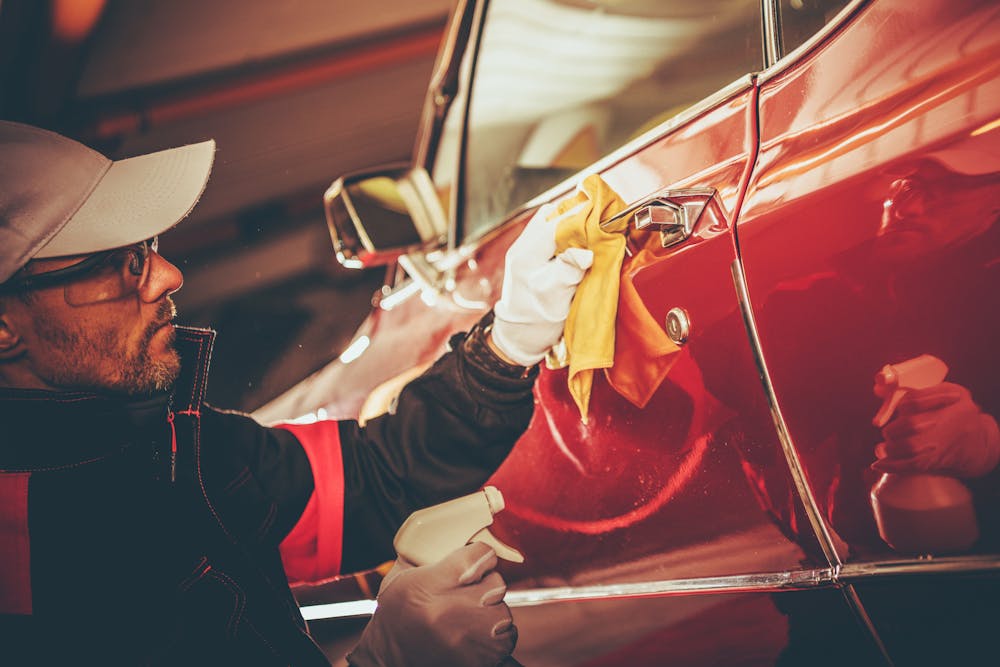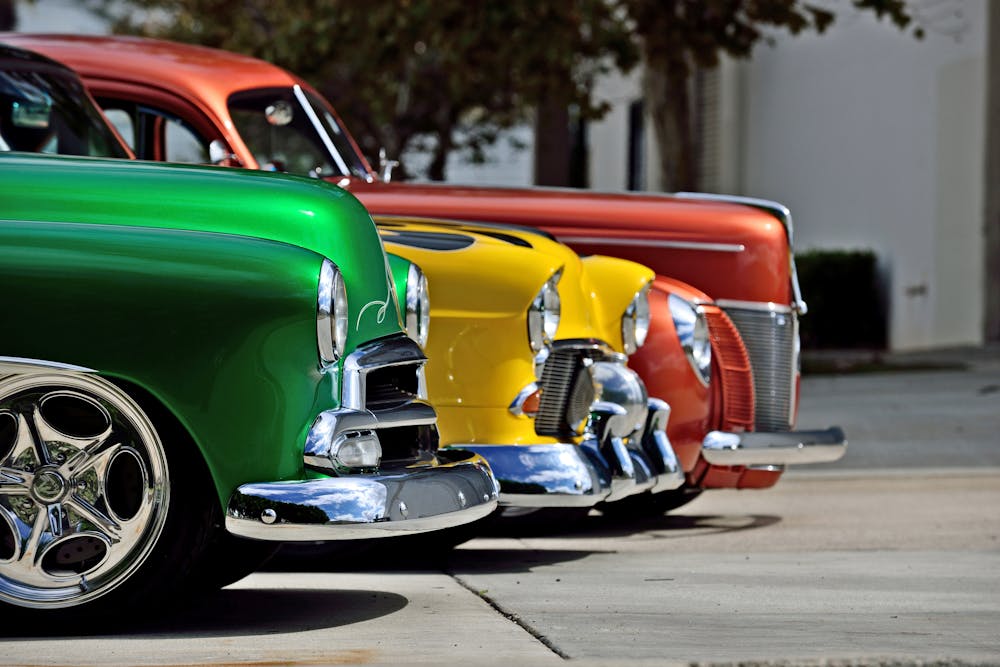How to find the right cover for your classic car
If you’re the proud owner of a classic car you’ll want to protect your passion. Here’s what you need to know about classic car insurance with tips for getting the right quote for your car.
What is classic car insurance?
It’s a specialist cover designed for old or vintage cars mainly used for leisure.
Similarly to standard car insurance, you can choose different levels of cover. You may also get unique benefits tailored to your car’s age, make and model.
It’s often cheaper, but the premium will depend on why you use your classic car and how often you drive it.
Who needs classic car insurance?
It’s a legal requirement to insure any car you drive on Ireland’s roads, but you may need a specialist insurance policy for your vehicle if it’s a classic or vintage car.
Classic cars are usually:
A vast range of car makes and models count as classics. So, whether you own a classic Mini, Jaguar, Triumph or Japanese classic car, insurance specifically tailored to your vehicle and driving habits is worth considering.
How do you know if you need specialist cover?
Some cars are obviously classic or vintage because of their age, make and model, but for insurance companies, it may depend more on:
- how often you use your car
- the mileage
- vehicle condition
The definition often varies between insurers, so it’s down to the insurance company to decide if your vehicle qualifies as a classic car.
How classic car insurance differs from standard cover
Despite the similarities with standard car insurance, classic car cover differs from a standard policy because
- It assumes you’ll drive fewer miles, take extra care on the road, and keep your car safe and secure, so it’s based on lower risk.
- If you need to claim, you can set an ‘agreed value’ for your vehicle. This is helpful if your vintage car is highly priced or modified.
- Tailored benefits - like discounts and breakdown assistance - might be offered if you’re a member of a car club.
- Your classic car is more likely to have been modified due to age, but this shouldn’t count against you, unlike with regular car insurance.
- No claims bonus (NCB) isn’t always offered with classic car insurance due to the low risk of a claim.
- Some insurers only offer classic car cover to drivers who are at least 25 years old or have over 12 months of driving experience.
What does agreed value mean?
This is the payout sum agreed with your insurer.
It’s the amount of money you’ll get for your vehicle minus any policy excess and the most an insurer will pay if your vehicle is:
- stolen or lost
- damaged beyond repair
- or if the cost of repairs is greater than the agreed value.
How old does a car have to be for classic car insurance?
Insurance companies in Ireland generally identify a car as classic or vintage when the vehicle is over 20 years old, but other factors may come into play.
In fact, every insurance company you ask may have a different definition, so it’s best to check with each insurer.
Here’s some of the criteria insurers use to qualify a classic car:
- The age of the car: Some insurers consider cars over 15 years old classics, while others require them to be at least 25 years old.
- The condition of the car: The vehicle should be in very good condition for its age. Modifications are acceptable to maintain the integrity of the vehicle.
- How often it’s used: The vehicle needs to be an occasionally-used second car rather than the main car you drive daily.
- The mileage you do: Your annual mileage must be low, generally less than 5,000 miles.
What is classed as a vintage car?
Cars made between 1919 and 1930 are often referred to as vintage. However, Irish motor tax laws define any car older than 30 years as ‘Vintage’.
The Irish Veteran and Vintage Car Club has defined vehicle type as:
- Pre 1905 - Antique
- 1905-1918 - Veteran
- 1919-1930 - Vintage
- 1931-1945 - Post vintage
- 1946 to 1991 – Classic
Vintage cars can be extremely valuable, so you’ll need to invest time and money in finding and buying the right vintage car insurance for your prized possession.
It’s, therefore, vital to have the right insurance in place so you don’t lose out financially if your car is stolen or involved in an accident.
Types of classic car cover in Ireland
Like regular car insurance, you can choose from three levels of cover. It’s essential you get the right level of protection for a possession you value so highly.
- Third Party only: Compensates third parties if you cause an accident. Damage to your car won’t be covered. It’s the minimum legal requirement.
- 3rd Party, Fire and Theft: Covers third parties plus protection for damage to your vehicle caused by fire or theft. Damage by vandalism isn’t covered.
- Comprehensive: Covers all parties involved in accidents, your car and your belongings. Plus theft and damage caused by vandalism.
What other benefits are covered?
Here are some other things you may find covered on a classic car comprehensive policy:
- Classic car shows and display
- Windscreen cover
- Breakdown assistance
- European cover
- Legal assistance
- Personal injury
Some specialist policies also include third-party trailer cover or cover while your vehicle is being restored.
How much is classic car insurance in Ireland?
Classic car insurance generally costs less than standard car cover, so shop around for the cheapest quote with the right level of protection.
As with a standard car policy, the price depends on many factors besides your car’s make and model. Check out our guide on how insurance quotes are calculated to find out more about how car insurance premiums are set.
Why is classic car insurance cheaper?
Classic car owners can be rewarded with cheaper premiums because they are generally considered low-risk. This type of cover is usually cheaper than regular car insurance for several reasons:
All of these factors often make classic car insurance cheaper than standard car cover.
What about regular older cars?
Regular, older cars that are used as the main car are often more expensive to insure because they:
- have fewer safety features
- can be difficult and expensive to repair
- can be an easy target for theft
You must get the right type of insurance for your car, even if it means paying more. If you’re unsure what kind you need, speak to a broker or insurer.
Do you need to be an owner’s club member to get classic car cover?
No, you don’t need to be a car club member, but you may get discounted insurance through an owner’s club.
It’s worth finding out from various owner’s clubs if they link up with a specific insurer or check if your insurer will issue you a discount based on your car club membership.
What are the pros and cons of classic car insurance?
There are many benefits to buying classic car insurance, but there are also disadvantages, like restrictions on mileage or the lack of a no-claims bonus.
Pros
Cons
Is classic car insurance worth it?
Classic cars in pristine condition will gain value the older they get rather than depreciate like regular cars.
If you think your car qualifies as a classic, talk to your existing car insurer to find out whether it is eligible for classic car cover.
If it is, get a quote and ask about any discounts. Once you have a price, shop around or talk to a specialist broker to compare multiple quotes.
Remember that the cheapest classic car insurance policy may not be the best option, so decide the benefits you need and check the T&Cs.
Tips to find the best cover for your classic car
To protect your classic car you’ll want to ensure you’ve got quality cover at an affordable price. Here are some things you can do to get the best value protection for your classic car.
Other helpful considerations
Some classic car insurance terms differ from regular car insurance, and some features are more significant to classic car owners.
Here’s a couple of other things you may want to take into account:
No claims bonus
Most insurers don’t allow a no claims bonus to be used on their classic car insurance policies.
This is because, for most people, it’s their second car and is only covered for occasional use. You can benefit from a no-claims discount on your primary car.
Salvage retention rights
If the vehicle is in an accident and written off, some insurers will keep the salvage, while others will allow you to keep it and deduct its value from the claim.
The salvage can be valuable for spare parts, so if you want to retain it in this circumstance, you should ensure your policy allows this.
Modifications
Although modifications are more common with classic cars, you must inform the insurer if the vehicle has been modified e.g. adding power steering or air conditioning.
You should declare any modifications when you apply for a quote and when any future modifications are made after you take out the policy, or it could invalidate a claim.
Save money on car insurance
Find affordable car insurance cover today

